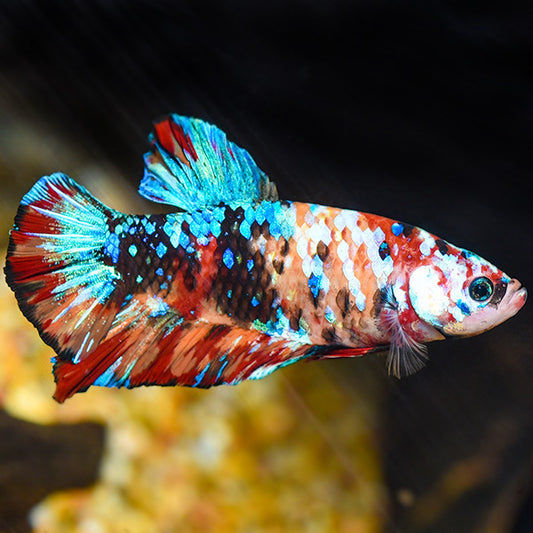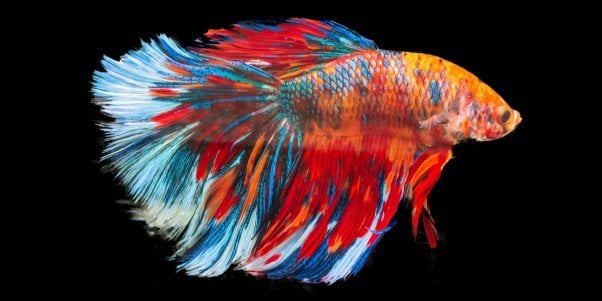Betta Fish Diet Regimen: What to Feed Your Betta for Ideal Health And Wellness
Betta Fish Diet Regimen: What to Feed Your Betta for Ideal Health And Wellness
Blog Article
Everything About Betta Fish: Understanding Their Special Needs, Actions, and the most effective Practices for Optimum Care
Comprehending the unique needs and behaviors of Betta fish is crucial for any type of aquarist looking to supply optimal care. These exciting creatures, indigenous to the warm waters of Southeast Asia, display distinctive territorial tendencies and need specific environmental problems to thrive. From selecting the right container size to acknowledging possible health problems, numerous variables considerably affect their health. As we explore these elements additionally, the effects for both novice and skilled fish caretakers come to be significantly evident, questioning concerning how finest to fit these exceptional fish in our homes.
Betta Fish Introduction
Although usually appreciated for their lively shades and streaming fins, Betta fish, clinically called Betta splendens, are complex creatures that call for details like prosper. Originating from Southeast Asia, these freshwater fish are known for their territorial nature and one-of-a-kind actions. Betta fish show sexual dimorphism, with males displaying a lot more brilliant colors and longer fins than females.
Their hostile propensities, especially among men, require cautious consideration when housing them. Bettas are often maintained in single-specimen storage tanks to avoid territorial disputes. Nonetheless, they can exist side-by-side quietly with certain compatible species in bigger neighborhood containers, supplied the environment satisfies their requirements.

To guarantee optimal treatment, aquarists need to comprehend their unique behavioral characteristics, nutritional requirements, and environment needs. betta fish. With correct attention, Betta fish can exhibit their vibrant characters and prosper in a well-maintained aquarium setting
All-natural Environment and Setting
Betta fish thrive in a diverse range of natural environments, primarily found in the superficial waters of Southeast Asia, including rice paddies, swamps, and slow-moving streams. These atmospheres are defined by cozy temperatures, generally in between 75 ° F and 82 ° F(24 ° C and 28 ° C ), and a pH level varying from 6.5 to 7.5, which is ideal for their health and wellness.
In their natural environments, Betta fish are accustomed to dense plants, providing both sanctuary and reproducing premises. The existence of plants such as floating water lilies and thick grasses not just supplies defense from killers however likewise adds to the oxygenation of the water, which is necessary for their breathing needs. Furthermore, these settings usually have locations of still water, allowing Betta fish to exhibit their all-natural habits such as bubble nesting.
Understanding the natural habitat of Betta fish is crucial for aquarium lovers. Replicating these problems-- through water temperature, pH balance, and the inclusion of real-time plants-- can substantially improve the overall health and wellness and long life of these captivating fish, guaranteeing they thrive in a home aquarium setting.
Social Actions and Communications
Understanding the social behavior and interactions of Betta fish is essential for successful fish tank monitoring. Betta fish, or Siamese fighting fish, are recognized for their distinct behavioral attributes, characterized largely by territoriality and aggression.
On the other hand, female Bettas show less hostile actions and can index exist side-by-side in groups, referred to as sororities, if introduced effectively. It is crucial to monitor their interactions closely, as pecking order and prominence can lead to disputes. Understanding the characteristics within a Betta community is essential; establishing concealing places and guaranteeing ample area can minimize aggression.
In enhancement, Betta fish might likewise present interest and social behaviors towards other types. While they can coexist with particular non-aggressive container companions, it is vital to pick suitable types to stay clear of stress and anxiety and hostility. Generally, identifying these social interactions is key to promoting a harmonious aquarium setting for Betta fish.
Vital Care Guidelines
Offering correct treatment for Betta fish is crucial to their health and wellness and wellness. To make sure a thriving setting, it is crucial to my review here preserve optimum water conditions. The water temperature level must be kept in between 76 ° F and 82 ° F(24 ° C to 28 ° C), while pH degrees must vary from 6.5 to 7.5. Regular water adjustments-- approximately 25% regular-- aid keep water high quality.
Betta fish require a suitable storage tank dimension; a minimum of 5 gallons is advised to offer ample area for swimming and hiding. Include designs and plants to produce a revitalizing setting, but prevent sharp things that could harm their fragile fins.

Finally, ensure the tank is outfitted with a filter to keep the water clean, but utilize a gentle filter to prevent solid currents that can worry the fish. By following these necessary care standards, owners can advertise a healthy and balanced and vivid Betta fish.
Common Health Issues and Solutions
In the care of Betta fish, understanding of common wellness issues is essential for maintaining their health. One widespread concern is fin rot, commonly brought on by bad water high quality or microbial infection. Symptoms consist of torn or discolored fins. To treat fin rot, boost water conditions and think about making use of a broad-spectrum antibiotic.
One more usual ailment is ich, a parasitic infection characterized by white spots on the fish's body (betta fish). Therapy involves enhancing water temperature and including fish tank salt to the tank, as this can aid eliminate the bloodsucker
Swim bladder problem is additionally regularly observed, causing buoyancy issues. This condition might emerge from overfeeding or bowel irregularity. A fasting period of 24-48 hours, followed by a diet plan of blanched peas, can give relief.
Finally, bettas might deal with velvet condition, suggested by a gold dust-like appearance on their skin. Therapy typically requires medication specifically made for outside parasites, along with enhanced tank health.
Regular surveillance of water criteria, keeping a tidy find this setting, and supplying a well balanced diet plan are essential precautionary procedures. By attending to these wellness issues quickly, Betta fish can lead much healthier, a lot more vibrant lives.
Conclusion
In recap, effective betta fish treatment calls for an understanding of their one-of-a-kind requirements and behaviors. Offering an ideal environment, consisting of suitable tank dimension and water problems, is important for their wellness. Additionally, recognizing their territorial nature and guaranteeing adequate concealing spots can avoid aggression. Routine surveillance of wellness and water quality, together with a balanced diet, adds to the durability and vibrancy of betta fish. Complying with these guidelines will cultivate a successful marine ecosystem for these captivating animals.
Report this page